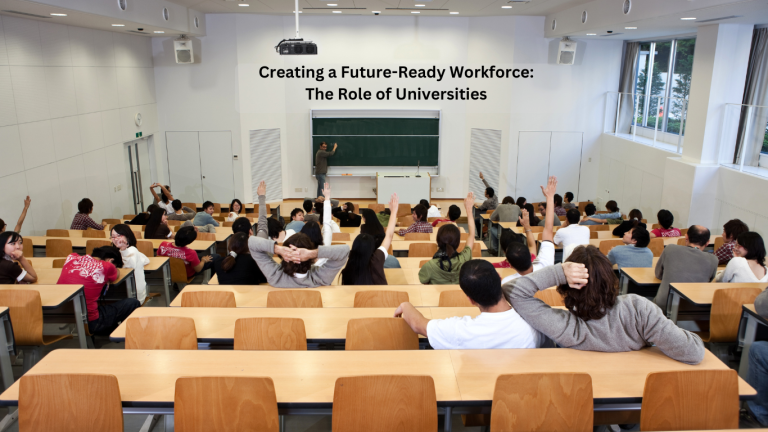In today’s rapidly evolving job market, universities must focus on creating a future-ready workforce to ensure their students are prepared for the careers of tomorrow. Creating a future-ready workforce means not only teaching students the technical knowledge they need but also equipping them with adaptable skills for a world driven by technological advancements. As industries evolve, so do job requirements, and universities that emphasize creating a future-ready workforce are the ones that will truly succeed in preparing their graduates for success.
To stay ahead of the curve, universities must actively invest in strategies that go beyond traditional teaching. This is where platforms like Qollabb come into play, helping universities in creating a future-ready workforce by offering students valuable opportunities to gain real-world experience. By providing access to internships and project work, Qollabb connects students with the experiences they need to thrive in an increasingly competitive market.
Why Is Creating a Future-Ready Workforce Important?
The world of work is changing faster than ever before. Many jobs that exist today may become obsolete within the next decade, and new job roles will emerge that require different sets of skills. This dynamic shift demands that universities focus on creating a future-ready workforce by adapting their educational models to meet the demands of tomorrow’s workplace.
Employers are now looking for candidates who not only have specialized knowledge but also possess problem-solving, critical thinking, and adaptability skills. Universities play a pivotal role in ensuring their students develop these competencies. It’s no longer enough to have theoretical knowledge; students must also gain hands-on experience that allows them to tackle real-world challenges. The most effective way to create a future-ready workforce is to integrate learning with industry exposure.
The Role of Internships and Real-World Projects
Internships and real-world projects are crucial elements in the process of creating a future-ready workforce. These opportunities allow students to apply classroom theory in a practical setting, bridging the gap between academic learning and professional experience. By working on live projects or taking part in internships, students can develop skills that are critical to navigating the evolving job market.
This is where platforms like Qollabb make a significant difference. Qollabb connects students with companies and real-world projects that are aligned with their field of study. By doing so, students gain practical experience that prepares them for future roles. Moreover, internships help students build networks, explore career options, and develop an understanding of workplace culture. These are invaluable assets for anyone looking to secure a future-ready career.
Universities and Industry Collaboration: A Key to Success
Creating a future-ready workforce involves not just students and universities but also the active participation of industries. Universities that form strong collaborations with industries are better positioned to offer their students real-world opportunities. These partnerships allow universities to provide students with up-to-date knowledge and hands-on experience that align with industry trends.
Qollabb’s platform enables such collaborations by acting as a bridge between universities and companies. Through Qollabb, universities can provide students with internship and project opportunities, ensuring they gain the practical skills that industries value. This collaboration is key in preparing a workforce that is adaptable and proficient in meeting the demands of tomorrow’s job market.
How Qollabb Supports Universities in Creating a Future-Ready Workforce
At the heart of creating a future-ready workforce is the need to provide students with access to the right opportunities at the right time. Qollabb plays a pivotal role in helping universities achieve this goal by offering a platform where students can find internships and projects across various industries. Here’s how Qollabb helps universities in creating a future-ready workforce:
1. Access to Internships:
Through Qollabb, students have access to a wide range of internship opportunities across industries such as technology, finance, marketing, and more. These internships help students gain practical skills that are essential in today’s job market.
2. Real-World Projects:
Qollabb connects students with live projects that companies are working on. By participating in these projects, students can apply their academic knowledge to solve real-world challenges, enhancing their problem-solving and critical thinking abilities.
3. Collaborative Learning:
Qollabb fosters a collaborative environment where students from different disciplines work together on projects. This interdisciplinary approach is essential in creating a future-ready workforce, as it encourages teamwork and a broader perspective.
4. Industry Networking:
By working on internships and projects through Qollabb, students have the opportunity to network with professionals in their chosen industries. Building a professional network early on is crucial for career development, and Qollabb facilitates this process effectively.
Equipping Students for Tomorrow’s Jobs
To fully prepare students for the future, universities must prioritize both academic learning and the development of practical skills. Creating a future-ready workforce involves a blend of technical expertise, soft skills, and hands-on experience. Platforms like Qollabb play a crucial role by giving students access to internships and real-world projects that promote skill development.
Universities must also continuously update their curricula to include emerging technologies and industry trends. This keeps students equipped with the latest knowledge and skills to thrive in a dynamic work environment. With platforms like Qollabb, universities can create opportunities aligned with industry demands, helping students build essential skills for future jobs.
Conclusion: Preparing for the Future
In conclusion, creating a future-ready workforce requires a concerted effort from universities, industries, and platforms like Qollabb. Universities play a crucial role in equipping students with the skills and experiences needed for a changing job market. By offering internships and real-world projects through Qollabb, universities provide practical experiences that set students apart in the competitive job market.
The future of work is evolving, and so should the way universities prepare their students. Through collaboration, experiential learning, and platforms like Qollabb, universities can help create a workforce ready for today and future challenges.





